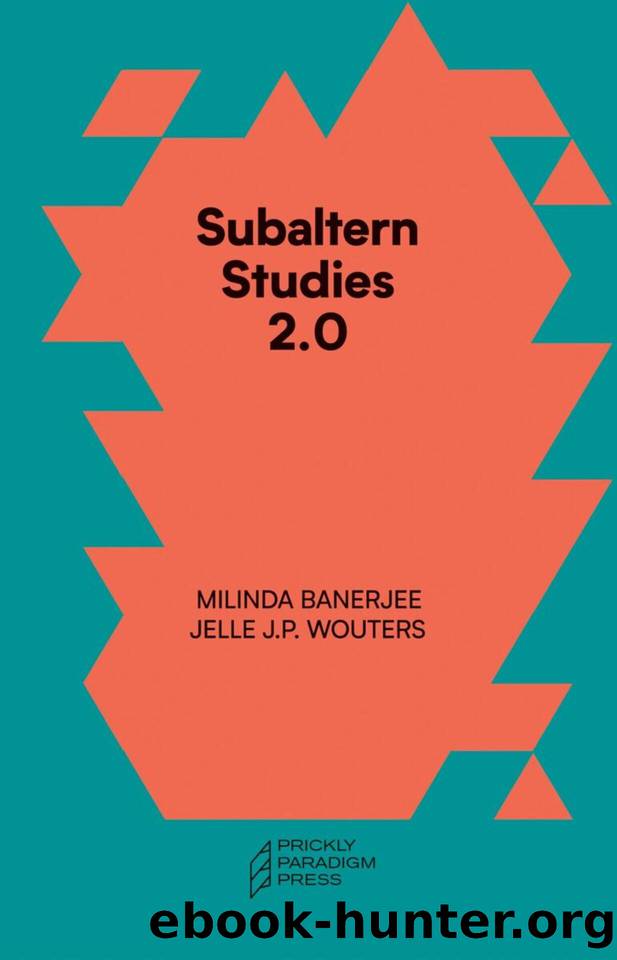Subaltern Studies 2.0 by Milinda Banerjee & Jelle J.P. Wouters

Author:Milinda Banerjee & Jelle J.P. Wouters [Banerjee, Milinda & Wouters, Jelle J.P.]
Language: eng
Format: epub
Publisher: Prickly Paradigm Press
Published: 2022-11-05T00:00:00+00:00
Return, Ancient Constitution: What Was, Shall Again Be!
We may call this an ancient cosmic constitution. It encourages us to devise the future constitution of a more-than-human demos, a parliament of beings where the agency and welfare of nonhuman beings are given recognition alongside those of humans. Self-restriction of desire is designed here to limit production and consumption; it enables degrowth. This ancient and living constitution prohibits untrammelled slaughter of animals and plants, the destruction of ecosystemsâthose indispensable building blocks of capitalism.
When nineteenth- and early twentieth-century Europeans theorized about religion in relation to society, Christianity was uppermost in their mind, particularly in its modern form, as accomplice of confessional state building, colonialism, and counter-revolution. Hence Ludwig Feuerbach saw religion as alienation of manâs humanity to God. In reappropriating humanity, he denounced and exiled the animal from the ethical sphere. Following in that trail, Marx saw religion as an effect of ruling class domination, a mark of human wretchedness; Durkheim, as the point where human society recognized itself in the shape and name of the divine. None of them took nonhuman sentient beings seriously as norm-constituting actors. Religion was enclosed off by humanity. The twenty-first century demands that this expropriation of the divine by the human be undone. Human exceptionalism has become our fatal fetish, justifying limitless avarice and commodification as progress to freedom. Society must now be amended in service of a demos that surpasses the human, where nonhuman beings are ancient and indigenous citizens. Comrade metapersons must help us drown the sad freedom of possessive man.
The center of gravity of the political needs to be shifted from human beings to beings as such, from possessive men to communities. If state and capital both emphasize the sovereignty and self-contained individuality of their âI will,â here we see a move away from âI willâ to âI relateââfrom individuality to relationality. But these declarations are still contained within the framework of the state. In Ecuador and Bolivia, as elsewhere on earth, Indigenous movements and antiextractivist struggles have been repeatedly thwarted by state power. To unlock the full potential of these declarations, the settler-colonial-origin state needs to be dismantled, decolonization needs to be completed.
In his new book The Climate of History in a Planetary Age, Dipesh Chakrabarty argues that anticolonial Asian and African intellectuals and state builders were invested in exploiting the environment to achieve human prosperity: they shared with Europeans a fundamental belief in technological growth. He casts Jawaharlal Nehru, first prime minister of independent India, as a paradigmatic thinker here. For Chakrabarty, the goal of redistributive justiceâstemming out of socialist, anti/postcolonial, and feminist discourses about subaltern well-beingâseems oppositional to environmentalist concerns. The argument runs: if poor Indians, Chinese, and Africans demand the same living standards as Europeans and Americansâfuel-sucking air-conditioners and carsâit spells ecological disaster.
Our reading of anticolonial thought differs from Chakrabartyâs. Nehruvian developmentalist ideology won only through tremendous violenceâby suppressing popular revolutions in Telangana and Tripura; by submerging the antistatist thought of figures like Mahatma Gandhi and Kazi Nazrul Islam; by
Download
This site does not store any files on its server. We only index and link to content provided by other sites. Please contact the content providers to delete copyright contents if any and email us, we'll remove relevant links or contents immediately.
The Lonely City by Olivia Laing(4129)
Animal Frequency by Melissa Alvarez(3762)
All Creatures Great and Small by James Herriot(3527)
Walking by Henry David Thoreau(3238)
Exit West by Mohsin Hamid(3197)
Origin Story: A Big History of Everything by David Christian(3145)
COSMOS by Carl Sagan(2961)
How to Read Water: Clues and Patterns from Puddles to the Sea (Natural Navigation) by Tristan Gooley(2877)
Hedgerow by John Wright(2782)
The Inner Life of Animals by Peter Wohlleben(2776)
Origin Story by David Christian(2692)
How to Read Nature by Tristan Gooley(2669)
Project Animal Farm: An Accidental Journey into the Secret World of Farming and the Truth About Our Food by Sonia Faruqi(2668)
How to Do Nothing by Jenny Odell(2651)
Water by Ian Miller(2598)
A Forest Journey by John Perlin(2589)
The Plant Messiah by Carlos Magdalena(2458)
A Wilder Time by William E. Glassley(2367)
Forests: A Very Short Introduction by Jaboury Ghazoul(2337)
